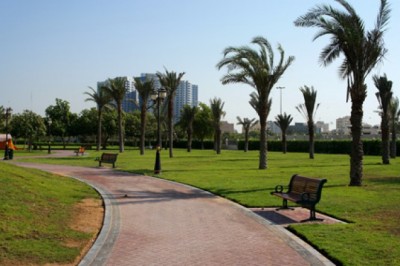
Dubai, United Arab Emirates — Amidst the glimmering skyline of the Middle East, where towering skyscrapers stand as symbols of modern innovation, a hushed transformation is underway. The region's relentless pursuit of architectural excellence and sustainability has given rise to a remarkable movement: the rise of Spanish ceramic tiles as a quiet yet potent force reshaping the very fabric of design, luxury, and environmental responsibility.
A Silent Revolution with Loud Impacts
In a region marked by rapid urbanization and grandeur, there's an escalating concern about the environmental toll. The Middle East's insatiable appetite for progress is met with a growing realization – the need for sustainable development. At the heart of this transformation, Spanish ceramic tiles are proving to be catalysts of change.
The journey toward sustainability is underscored by impressive figures. The GCC’s ceramic tiles market is projected to surge with a staggering CAGR of 7.9% by 2028, fueled by a swelling demand for eco-friendly construction materials. This signifies more than just market dynamics; it reflects the region's collective shift towards a more eco-conscious future.
But statistics aren't mere numbers; they represent a change taking root. Spanish ceramic tiles have already made a significant impact on the UAE's tile market – a sign that the tides are turning. As awareness of the myriad benefits associated with sustainable tiles continues to gain traction, these numbers are likely to surge further, leading to a transformative architectural shift. The use of eco-friendly materials like Spanish ceramic tiles is set to spark a major change in architecture, matching the rising environmental consciousness and the desire for a greener future in the GCC region.
Sustainability in Focus: UAE and KSA Lead the Way Ahead of COP28
As the global spotlight converges on COP28, the Middle East emerges as a beacon of sustainable transformation, with the United Arab Emirates (UAE) and Saudi Arabia (KSA) leading the charge.
With a resolute commitment to decreasing its carbon impact, the UAE has set ambitious targets, including a net-zero emissions objective by 2050. A pivotal player in this endeavor, Dubai's Supreme Council of Energy (DSCE), has launched an ambitious initiative to retrofit 30,000 buildings by 2030. Notably, these efforts are projected to yield a remarkable reduction of 1 million tonnes of CO2 emissions.
Furthermore, KSA's substantial concentration of Gold and Platinum LEED-certified buildings signifies a strategic push for green architecture. This approach aligns perfectly with the country's goal to reduce carbon emissions by 28% by 2030.
Al Qana: A true example of sustainable luxury in Abu Dhabi
In the heart of Abu Dhabi, Al Qana shines as a prime example of sustainable elegance. Created by architect Tony Abi Gebramel and designer Jacqueline Saad Abi Gebramel, it showcases the potential of Spanish ceramic tiles. These tiles have turned luxury into a blend of tradition and modernity. Al Qana's dedication to its cultural heritage mirrors Porcelanosa’s and Tile of Spain's commitment to sustainability.
Beyond perfect aesthetics, Al Qana's intelligent design, supported by Spanish ceramic tiles crafted from sustainable materials, goes beyond redefining luxury – it prominently demonstrates environmental responsibility. With smart energy systems and timeless design, it embodies responsible luxury, resonating with a region dedicated to achieving equilibrium between progress and environmental stewardship.
A Promising Horizon
As the Middle East carves its trajectory through innovation and design, Spanish ceramic tiles emerge as an emblem of hope. Their quiet presence weaves narratives of beauty, luxury, and environmental accountability. In a realm that hungers for sustainability without compromising on allure, the Spanish ceramic revolution is no longer a whisper – it's a clarion call for change. These tiles are more than just building materials; they're agents of transformation, crafting a harmonious marriage between aesthetics and environmental stewardship.
The journey has just begun. With every tile laid, the Middle East inches closer to a reality where innovation, design, and sustainability coalesce into a harmonious symphony, resonating through the landscapes of progress.



















Facebook Conversations
Disqus Conversations